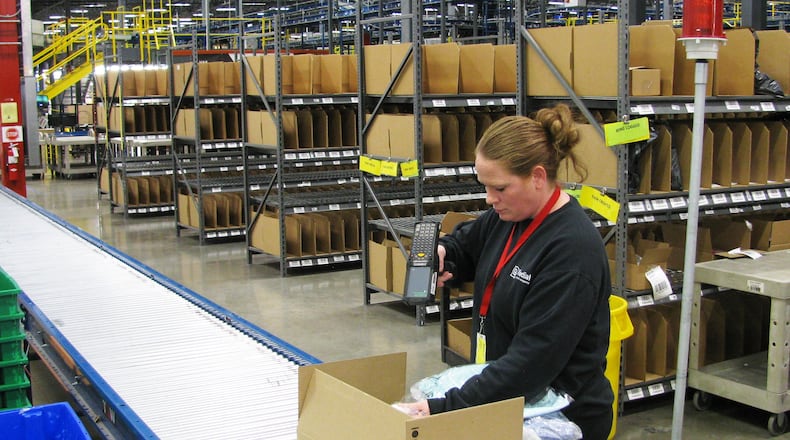With speed bumps like higher interest rates, lingering inflation and lower commercial real estate values, the Georgia economy will tap the brakes in the new year. But though growth might slow, it won’t decelerate by as much as the national economy, according to the annual forecast of the University of Georgia Terry College of Business.
Moreover, growth will continue for both Georgia and the U.S., said Ben Ayers, Terry’s dean, who delivered the prediction Monday to a luncheon crowd of nearly 600 at the Georgia Aquarium.
The state’s economy will expand 1.1%, while unemployment will tick up and the number of jobs will grow by only 0.7%, less than half the pace of this year, he said. The U.S. growth rate will be 0.8%, according to the forecast.
“The state of Georgia will experience an economic slowdown, but the good news is that we are not projecting a recession,” he said.
Not that a downturn is impossible, Ayers said: “Chances of a recession are one-in-three. We think a ‘soft landing’ is more likely than not.”
The Federal Reserve’s campaign of rate hikes, aimed at taming inflation, has made borrowing more expensive for households and business. With inflation dropping, but still higher than the Fed would like, those rates aren’t rising, but they are not coming down either.
That means less energetic hiring and more trouble paying bills.
Higher mortgage rates have chilled the housing market, so even with few homes on the market, average home prices are likely to drop this year, according to the forecast. With so many people working remotely at least part of the week, vacancies in office space are rising.
That threatens banks that have made loans to develop real estate. Were that to be widespread, that could spur a financial crisis, similar to the one that threw the economy into a deep recession in 2007-09.
The greatest dangers to the Georgia economy may come from far-off geopolitical events like the war in Ukraine or an expanded Middle East war that disrupts oil shipments and sends energy prices soaring. But unless those kind of crises spin out of control, the Georgia economy should skirt disaster, according to the UGA prediction.
After several years of robust hiring and higher wages, virtually all the signals from companies and consumers will show a deceleration without reversing those gains, Ayers said. “We expect late payments and bankruptcies will increase but only to the levels we saw before the pandemic.”
Georgia overall has the advantage of momentum, he said.
The population has continued to grow, while state and federal governments have greased the skids for a surge of job-creating investments in manufacturing, especially in production and parts for electric vehicles, he said.
Also speaking Monday was Avery Shenfeld, chief economist of CIBC Capital Markets, who said many people have thought of the U.S. economy like Wily Coyote in the old Roadrunner cartoons, racing out into thin air, defying physics for several impossible seconds before surrendering to the inevitable.
But the American household has proven resilient, continuing to spend, and with incomes mostly outpacing inflation in recent months, they have kept the economy airborne, he said.
“We’ve been fearing that at some point gravity would take hold,” Shenfeld said. “But we are not going to end up crushed at the bottom of the cliff with an anvil falling on us.”
The economy has defied expectations because people and companies are flexible, Christopher Fagan, a partner at Moore Colson, an Atlanta-based accounting and consulting firm, said in an interview with The Atlanta Journal-Constitution.
And while they hate how high interest rates make borrowing more costly, companies and consumers hate it more when those rates are unpredictable, he said. “We definitely have some clients who are struggling. High interest rates — that pulls cash out of their business, cash you would have used.”
More than anything, it was the uncertainty about rates was a problem, Fagan said. “Now we know they are not heading to 10%. They may move up a half-point or down a half-point. It’s a headwind, but Americans in general are very resourceful. People are working around it.”
Economic outlook
Change in size of Georgia economy
2019: 3.5%
2020: -3.5%
2021: 7.0%
2022: 2.8%
2023: 3.0%
2024*: 1.1%
Change in number of jobs in Georgia
2019: 1.9%
2020: -4.5%
2021: 3.8%
2022: 4.4%
2023: 2.3%
2024*: 0.7%
Sectors expected* to have strongest growth in 2024
Education and health: 2.2%
Government: 1.7%
Manufacturing: 1.6%
Sectors expected* to have weakest growth in 2024
Logistics: -1.7%
Information: -0.3%
Construction: 0.2%
*Forecast
Source: University of Georgia, Terry School of Business, Selig Center for Growth
About the Author
Keep Reading
The Latest
Featured



